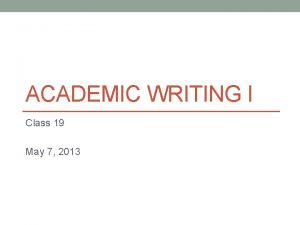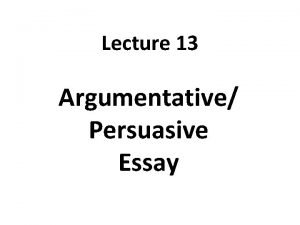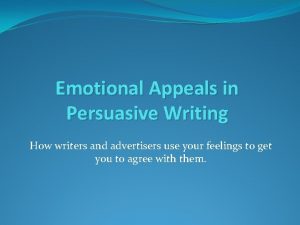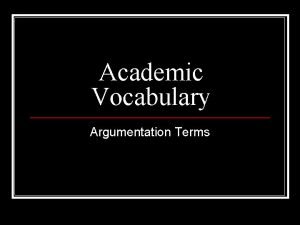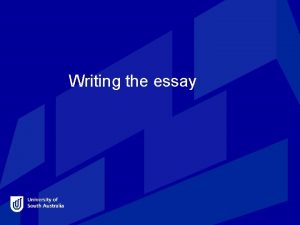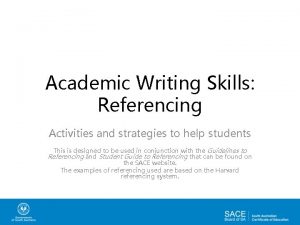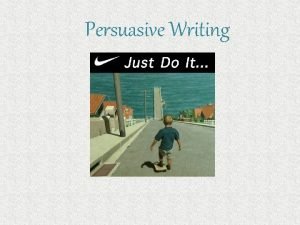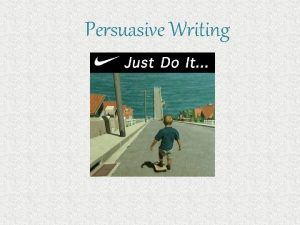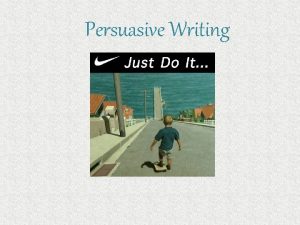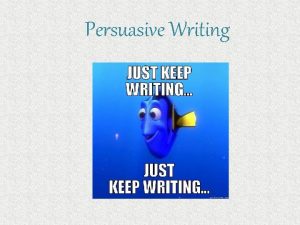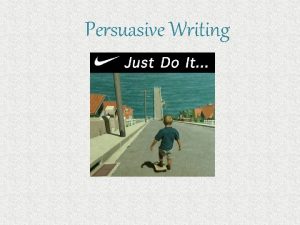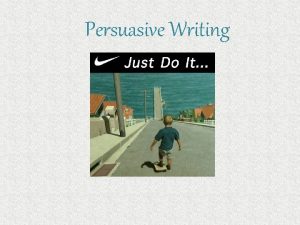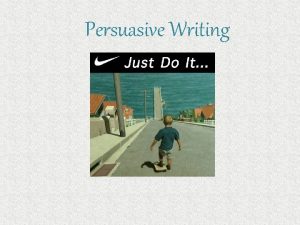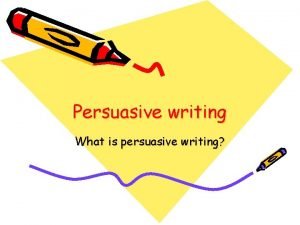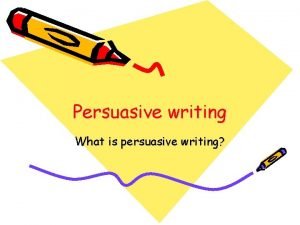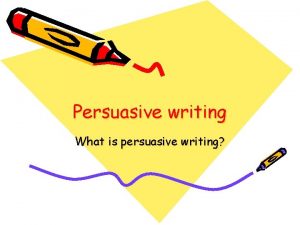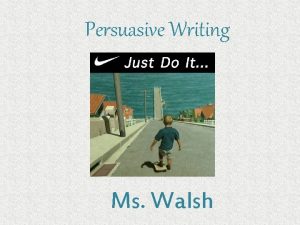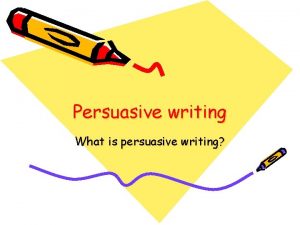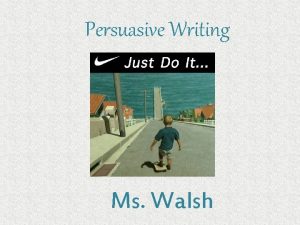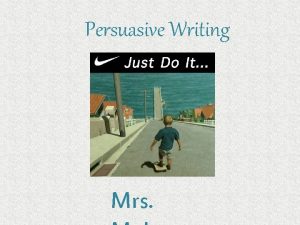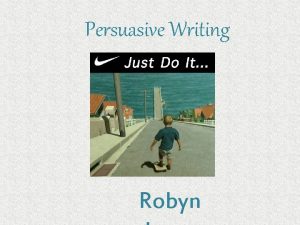Academic Persuasive Writing Argument vs Persuasion Argument discover








![Offering a Counterargument Addressing the opposition [counterargument] demonstrates your credibility as a writer Rebuttal/Refutation Offering a Counterargument Addressing the opposition [counterargument] demonstrates your credibility as a writer Rebuttal/Refutation](https://slidetodoc.com/presentation_image_h/ace4d3acebbe4e21896c2edbe29a39da/image-9.jpg)












- Slides: 21

Academic Persuasive Writing

Argument vs. Persuasion Argument (discover a truth)→conviction • • • To discover some version of truth, using evidence and reasons. Leads audience towards conviction, an agreement that the claim is true or reasonable or that the course of action is desirable Writers argue to discover some truth. Persuasion (know a truth) →action • • • Aims to change a point of view or to move others from conviction to action. Aggressively designed to change opinions through the use of both reason and other appropriate techniques. Writers persuade when they think they already know it.

What Is the Purpose of Argument? • All language has an argumentative edge that aims to make a point. • Argument seeks “…to invite others to enter a space of mutual regard and exploration” (7). • While arguments are aimed at winning, they also may also intend to inform, to convince, to explore, and to make decisions.

Arguments to Convince Among employed 19 -to 31 -year-old high school graduates who did not go to college, more than 30 percent had not been in their position for even a year. Another 12 percent had only one year of tenure. The pattern was much the same for women who had remained in the labor force for the four years prior to the survey. These are adults who, for a variety of reasons—a lack of skills, training, or disposition—have not managed to secure “adult” jobs. --Paul Osterman, “Getting Started” What is the argument? The current job situation is NOT tolerable and it is worthy of concern.

Arguments to Inform This is a woman who in 1939 could advise her admirers that they were missing the point, that their appreciation of her famous flowers was merely sentimental. “When I paint a red hill, ” she observed coolly in the catalogue for an exhibition that year, “you say it is too bad that I don’t always paint flowers. A flower touches almost everyone’s heart. A red hill doesn’t touch everyone’s heart. ” --Joan Didion, “Georgia O’Keeffe” What is the argument here? Didion argues that readers should pay closer attention to all the work of this artist.

The Role of Your Audience Understanding your audience is key to effective writing of all kinds, especially persuasive writing An argument is an implicit dialogue or exchange with your audience, so in writing arguments, assume there is a reader that will not agree with you Audience awareness is absolutely essential to successful persuasion and argument; therefore… Know your audience What is their position on the issue? How strongly do they feel about it? Are they open-minded enough to consider other views? What will their objections be to your argument?

The Thesis Statement …is the most important sentence in your paper …is an assertion …answers the question: “What am I trying to prove? ”. . . brings focus to the entire essay …lets the reader know the main idea of the paper …is not a factual statement or an announcement of purpose, but a claim that has to be proven throughout the paper.

Example: Which thesis statement Parents, often too busy to watch television shows with their families, can monitor their children’s viewing habits with the aid of the V-chip. To help parents monitor their children’s viewing habits, the V-chip should be a required feature for television sets sold in the U. S. This paper will describe a V-chip and examine the uses of the V-chip in American-made television sets.
![Offering a Counterargument Addressing the opposition counterargument demonstrates your credibility as a writer RebuttalRefutation Offering a Counterargument Addressing the opposition [counterargument] demonstrates your credibility as a writer Rebuttal/Refutation](https://slidetodoc.com/presentation_image_h/ace4d3acebbe4e21896c2edbe29a39da/image-9.jpg)
Offering a Counterargument Addressing the opposition [counterargument] demonstrates your credibility as a writer Rebuttal/Refutation [to rebut] is your proof/reasoning that the counterargument is wrong It shows that you have researched multiple sides of the argument and have come to an informed decision. Remember, keep a balanced tone when attempting to debunk the opposition

Counter-arguing Effectively Conceding to some of your opposition’s concerns can demonstrate respect for their opinions Remain tactful yet firm using rude or deprecating language can cause your audience to reject your position without carefully considering your claims

Toulmin Model Terms Data: Facts of evidence used to prove the argument Claim: The statement being argued (THESIS) Warrants: The general, hypothetical logical statements that bridges the claim and the data Qualifiers: Statements that limit the strength of the argument Rebuttals: Counter-arguments that show when the general argument does not hold true Backing: Statements that support the warrants (arguments that don’t necessarily prove the main point being argued, but do prove the warrants are true.

Toulmin Model Example

The Rhetorical Triangle Topic/Message (Logical Appeals) Content Audience/Readers (Emotional Appeals) Speaker/Writer (Ethical Appeals)

Appeal to Emotion (Pathos) • Appeals to the heart • Uses descriptive language • Uses figurative language

Appeal to Logic (Logos)

Appeal to Ethics (Ethos) • Credibility and trustworthiness of speaker/writer • Prove they are an authority on subject • Shared values (God/famous people/etc)

Appeals used in Writing Ethos "If his years as a Marine taught him anything, it’s that caution is the best policy in this sort of situation. “ "Better men than us have fought and died to preserve this great nation. Now is our turn to return the favor. For God and country, gentlemen!“ "More than one hundred peer-reviewed studies have been conducted over the past decade, and none of them suggests that this is an effective treatment for hair loss. " Pathos Logos

Rhetorical devices • Anaphora: Ex; “Five years have passed; Five summers, with the length of Five long winters! and again I hear these waters…” • Irony Ex: A man who is a traffic cop gets his license suspended for unpaid parking tickets. • the repetition of a word or phrase at the beginning of successive phrases or clauses • expression of something which is contrary to the intended meaning; the words say one thing but mean another.

Rhetorical Devices Parallel Structure (aka Parallelism) Ex: Dogs are great pets for the following reasons: they are loyal, they are loving and they are obedient. Allusion Ex: “I thought the software would be useful, but it was a Trojan Horse. ” The repetition of words, phrases, and clauses in a sentence or paragraph used to emphasize an idea. Allusions are often indirect or brief references to literature, mythology, Bible, or history

Rhetorical devices Figurative Language – metaphor, simile, imagery Is it that insidious smile with which our petition has been lately received? Trust it not, sir; it will prove a snare to your feet. Used to create pathos

• Rhetorical Question • Ex: Shall we acquire the means of effectual resistance, by lying supinely on our backs, and hugging the delusive phantom of hope, until our enemies shall have bound us hand foot? • A rhetorical question is one that requires no answer because the answer is obvious and doesn't need to be stated . The speaker (of the rhetorical question) is not looking for an answer but is making some kind of a point, as in an argument.
 Argument vs persuasion
Argument vs persuasion Technical academic writing
Technical academic writing Business writing vs academic writing
Business writing vs academic writing Persuasive summary
Persuasive summary Argumentative essay vs expository essay
Argumentative essay vs expository essay Persuasive techniques emotional appeal
Persuasive techniques emotional appeal Academic vocabulary argument
Academic vocabulary argument Teleological argument vs ontological argument
Teleological argument vs ontological argument Introduction examples for essays
Introduction examples for essays Uefap
Uefap Unity in academic writing
Unity in academic writing Quote about academic writing
Quote about academic writing Nominalisation
Nominalisation Fallacies in academic writing
Fallacies in academic writing Characteristics of academic writing
Characteristics of academic writing Semi open writing assignment
Semi open writing assignment Complexity in academic writing
Complexity in academic writing Harvard academic writing
Harvard academic writing How to cite a list of bullet points
How to cite a list of bullet points Assertive tone
Assertive tone Academic writing and composition
Academic writing and composition Contoh academic writing
Contoh academic writing


